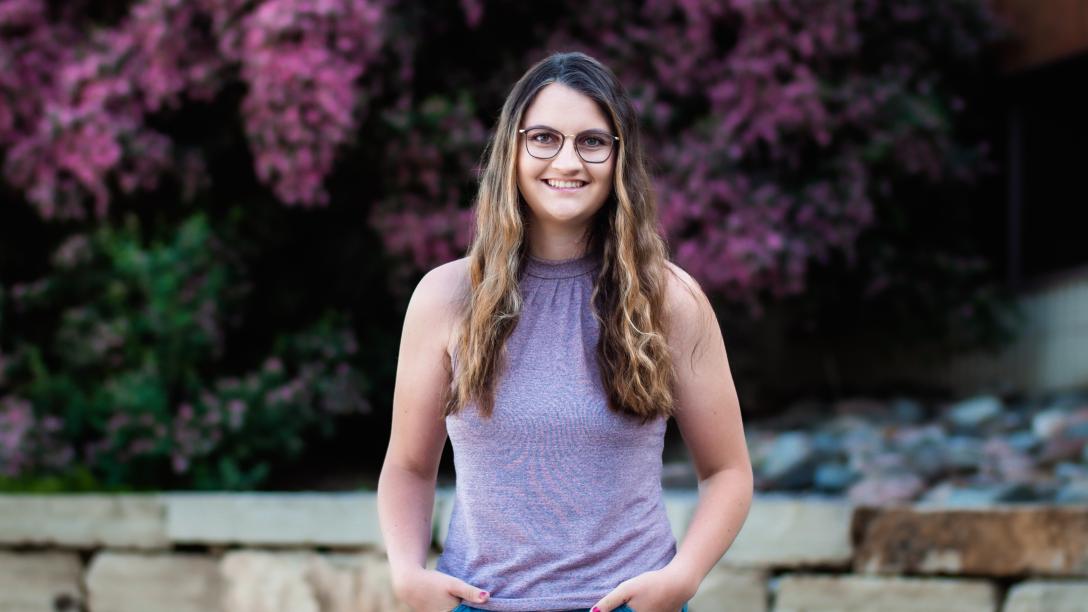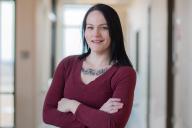Aims alumna Melanie Hansen-Wright got her start in precision agriculture at Aims Community College. Historically, this has been a male-dominated profession, but Melanie and other women are beginning to break into precision agriculture, bringing valuable skills and perspectives to the table. Melanie’s ambition and dedication to learning have served her well in entering this emerging and complex profession.
Category
- Alumni Spotlight
Audience
- Alumni
- Faculty
- General Public
- Staff
- Students
Related Links
Melanie Hansen-Wright Set In Motion a Career in Precision Agriculture at Aims
Melanie Hansen-Wright Set In Motion a Career in Precision Agriculture at Aims

Precision agriculture is a modern method that uses technology to help farmers care for their crops more effectively. By using tools like Global Positioning System (GPS), sensors, and computers, farmers can monitor their fields and give the plants exactly what they need. This helps save money, protect the environment, and grow healthier crops. It's a lot of data management, soil testing, soil mapping, yield maps and things like that,” Melanie said.
Melanie began studying this topic at Aims as a student at Colorado Early Colleges right before her senior year of high school. This concurrent enrollment arrangement allowed Melanie to attend Aims at no cost to her. While at Aims, she obtained an impressive number of credentials. This included an Associate of Science in Agribusiness, an Associate of Applied Science in production agriculture, and certificates in precision ag, ag production crops, ag production mechanics, and agribusiness management.
Finding Support and Mentorship at Aims
Melanie took most of her classes at the Fort Lupton Campus, the college’s hub for agricultural coursework.
She developed a connection with Professor and Agriculture Department Chair Amy McFarland. “Amy is phenomenal, Melanie said. “She really made it possible and helped me get classes to align with my schedule. Amy just has this way of teaching that makes sense. If you don't get it the first time, she can explain it in multiple ways until it clicks. I haven't found many college professors that are able to do that.”
In turn, McFarland enjoyed having Melanie as a student.“I taught her in several classes and one thing that always stood out to me was her true passion for agribusiness and the agriculture industry as a whole. Melanie made my job as an instructor so fun because she was genuinely interested in learning with the intent of making our agriculture industry better.”
Melanie felt supported by all her teachers. “At Aims, it was more about giving you the tools to succeed in each class and life itself.” Her classes at Aims also equipped her with the study skills to succeed at a four-year university and prepared Melanie to enter the industry. “The information that they teach in the classes is so based on what you need in the field you're going into,” she said.
Melanie recommends that other students begin their higher education at Aims with the advantage of working on general education requirements completed in a more one-on-one environment. “The class size is smaller for those gen ed classes,” Melanie said, “the teachers are going to go out of their way to make sure you understand the material. They'll slow down; they'll teach you.”
“My time at Aims was absolutely incredible.”
Melanie was also a member of the Aims Ag Club, which promotes and furthers agricultural fields through professional development, leadership training and activities for students interested in agricultural disciplines.
She went above and beyond in this extracurricular group and activities such as the National Ag Day celebration. “Melanie volunteered to bring her horse to participate in the petting farm and stood outside in very cold weather through the entire event and didn’t complain a bit, which is such a testament to her personality and dedication,” McFarland recalled.
Reaching for Success Outside of Aims
Aims faculty member, Jason French, worked with Melanie to get her first precision agriculture internship with Farmers Edge, a company with FarmCommand. This digital platform manages data for farmers to be more productive, profitable and sustainable. Her title was Customer Service Management (CSM) Intern. Melanie described this as a “great learning experience.”
Melanie also interned at Climate FieldView and helped troubleshoot precision ag equipment as a technology specialist. It included solving problems and pulling and analyzing data to provide the answers that the customers needed.
In both internships, she worked in a territory that covered Colorado, western Kansas, the Nebraska panhandle, and parts of Wyoming.
Her last internship was at RDO Equipment, expanding her knowledge of precision farming. Melanie helped with planner setups, GPS and sprayer setups in an area that spanned between Moorhead, Minnesota and Kindred, North Dakota. She also worked as a parts salesperson at the dealership.
After Aims, Melanie attended Northwest Kansas Technical College and obtained certificates in Precision Ag and Precision Ag Technology before transferring to North Dakota State University (NDSU). This spring, she received a Bachelor of Science degree in precision agriculture and minors in agribusiness and agriculture systems management from NDSU. “Melanie is now putting her experience and knowledge to work at her parents’ alfalfa, barley and corn farm in the Longmont area and her husband’s farm in Kansas, which produces milo and wheat.”
“There's a lot of long days and long hours, and it's hard. But if it's what you're passionate about, you can make it work.”
With all this experience, Melanie has advice for those pursuing a career in precision agriculture. “Don't be afraid to ask questions. Technology is ever-changing. You must stay on top of current events, know what's coming out and down the pipeline, stay involved, do your research, and keep learning all the time.” She also warns that you cannot control everything. “You can't control the price; you can't control the weather. You just have to roll with it.”
Changing Perceptions in Agriculture
One of the issues Melanie advocates for is changing misconceptions about agriculture due to a need for more communication and transparency. “Many farmers and ranchers are so busy that they don't really take the time to communicate what we actually do to the consumers. We only respond after consumers point fingers at parts of the industry they don’t like, usually caused from not understanding what we do,” she said. Melanie talks to people with a preconceived notion that farm work is still done mostly by hand and she educates them more about technology. “We have all these different technologies, from auto steer to variable-rate planters and variable-rate irrigation." With the growth of precision agriculture, “we're using less fuel, less water, less chemical, less seed, all of these things that enhance the farm business and help the environment.”
One example of this is the use of variable-rate spraying. “You can save up to 80 percent of chemicals sprayed on a field, which is huge, with today's prices, that can save thousands of dollars.” It also results in less runoff into waterways.
In addition to technology, the view of females in the industry is changing. Melanie admits that there is still a “good old boy” attitude among some of the older generations, but she sees a change. “I've noticed in the upcoming generation, the guys who are just now starting to take over their parents' or grandparents’ farm, and there's much less of it.”
While more women are entering the industry's ag business and education side, precision ag is still male-dominated. “In ag systems management and precision agriculture at NDSU, as of last May, only four of us were enrolled.” She and the other females were not treated differently than their peers, even though they were in the minority.
Melanie has an ultimate goal to make strides in precision ag by starting her own mapping company. She wants to help farmers to get data in the form of maps and other user-friendly data.
With her focus on continuing education and persistence, Melanie will be successful in whatever she does. McFarland agrees with this assessment. “It's no surprise to me that Melanie has continued to excel and has become one of the very few women in the field of precision agriculture. I’m excited to watch Melanie into the future, as I know she will continue to have great impacts on our industry.”


